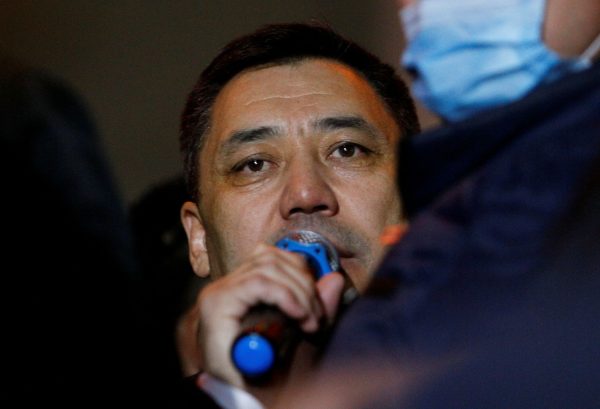But the events of October 2020 elections are unlike the Tulip Revolution of 2005, which marked former president Askar Akayev’s fall from power, or the unravelling of the state that went from former president Kurmanbek Bakiev’s fall in April 2010 to the Osh conflict of June 2010. This is a power grab by political, business and criminal networks.
Serving an 11-year sentence on kidnapping charges, nationalist politician Sadyr Japarov was still in jail on 6 October. He is now Kyrgyzstan’s prime minister and acting head of state following the resignation of president Sooronbai Jeenbekov on 15 October. Jeenbekov was president of Kyrgyzstan from 2017, having also served as prime minister between April 2016 and August 2017.
On 4 October the republic of 6 million people went to the polls to elect a new parliament. Amid reports of vote-buying, the elections returned a decisively pro-Jeenbekov parliament where only four of 16 parties cleared a 7 per cent electoral threshold. Three of these parties were seen as favouring the status quo.
In response, ordinary citizens and opposition parties took to the streets in Bishkek and across the country. Protesters seized the parliament and the presidential office, the White House.
On 6 October the Central Election Commission annulled the elections. A number of high-profile convicts were freed, including former president Almazbek Atambayev, former prime minister Sapar Isakov and Japarov himself.
The impasse appeared to favour the now-ousted president Jeenbekov, who sought to restore constitutional order by seeking the appointment of a new government and speaker of parliament, which could stand in should the president resign or be impeached.
The situation quickly transformed into a multi-player battle.
First, there are the supporters of the freed Japarov, organised and determined to have him installed as prime minister, and also evidently prone to resorting to street violence.
Second are the loyalists of the released former president Atambayev, who formed a tactical pact with former prime minister Omurbek Babanov, himself a former presidential contender and no friend of Atambayev.
Third, there is a coalition of opposition parties and social movements, including the Bir Bol, Ata Meken and Reforma parties. Many in this group felt uneasy about aligning with Atambayev, especially after protesters demanded a law preventing those with criminal convictions from participating in politics.
On 10 October Japarov was elected prime minister by 61 parliamentarians, though only 51 were allegedly present at the time of the vote. Jeenbekov declined to confirm the appointment, citing irregularities in the procedures that accompanied the vote, but on 14 October Japarov’s appointment was confirmed. A day later Jeenbekov resigned as president and reaffirmed his desire to avoid bloodshed in the face of protracted tensions.
Meanwhile, the new speaker of parliament Kanat Isaev refused to take up the function of acting president, concentrating power in the hands of Japarov.
A former policeman from the Issyk-kul region in eastern Kyrgyzstan, Japarov became a member of parliament after the 2005 revolution and rose up the ranks of the Bakiev regime (2005–2010), being appointed head of the anti-corruption agency. In 2010 he joined the nationalist Ata-Jurt party, led by Kamchybek Tashiev and staffed by loyalists of the old regime.
In 2012 Japarov and Tashiev were charged and arrested for allegedly attempting a coup. In 2013, as he campaigned for the nationalisation of the Kumtor gold mine, Japarov kidnapped a local politician. He fled the country before returning in 2017, when he was jailed.
The powerful figure behind Japarov is his long-time ally and nationalist firebrand Tashiev. Tashiev is now the leader of the nationalist party Mekenchil, which narrowly fell below the electoral threshold, receiving 6.99 per cent of the vote.
Four main considerations stand out in making sense of recent events.
First, against a backdrop of electoral fraud and real socio-economic grievances, the dispute represents a clash between competing networks of political, business and criminal groups in pursuit of state capture.
Second, although local politics is often explained in terms of divisions between northern and southern regions, both Jeenbekov and Japarov camps include southern groups or ‘clans’. Hailing from the east, Japarov is not a southerner, and his recent meeting with Issyk-kul crime boss Kamchy Kolbaev suggests the battle transcends a facile north–south reading of the situation.
Third, external powers have been conspicuously absent. Kyrgyzstan’s economic dependence on Beijing is frequently mentioned — including its $US1.8 billion in debt — but China’s response has so far been muted.
The Kremlin made an initial statement referring to the chaos in Kyrgyzstan, after which Russian President Vladimir Putin sent his emissary Dmitry Kozak to meet with Jeenbekov. Gambling on the losing horse, Russia finds itself with another volatile country on its periphery.
Fourth, Uzbek communities in the south are largely peripheral to this intra-Kyrgyz clash. Yet, the memory of how the involvement of Uzbek politician and businessman Kadyrjan Batyrov in favour of the interim authorities in the spring of 2010 was exploited by nationalists loyal to Bakiev is still fresh. Nobody in the community wants a repetition of that bloody conflict.
The events of October 2020 evoke a sense of deja vu, not because of their similarity to past revolutions, but because they returned politicians who were thought to have been consigned to history. One of Japarov’s first moves was the appointment of Tashiev to the position of Chairman of the State Committee for National Security.
The country that Japarov and his allies now control is mired in a public health crisis caused by the COVID-19 pandemic. Yet, as the nation teeters on the economic precipice, it remains led by someone who — by law — cannot run for president.
Matteo Fumagalli is a senior lecturer in the School of International Relations at the University of St Andrews.

